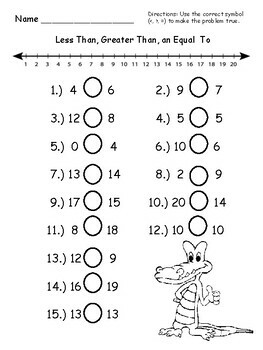

- #Greater than less than equal to centers for kindergarten how to
- #Greater than less than equal to centers for kindergarten professional

Working with others Working with knowledge, technology and information, and Working in and with society. For example, the European Union has identified three broad areas of competences that teachers require: Some evidence-based international discussions have tried to reach such a common understanding.
#Greater than less than equal to centers for kindergarten professional
The Organisation for Economic Co-operation and Development has argued that it is necessary to develop a shared definition of the skills and knowledge required by teachers, in order to guide teachers' career-long education and professional development. The teacher as manager of instruction the teacher as caring person the teacher as expert learner and the teacher as cultural and civic person. The competences required by a teacher are affected by the different ways in which the role is understood around the world. Factors that influence what is expected (or required) of teachers include history and tradition, social views about the purpose of education, accepted theories about learning, etc. This is partially because teaching is a social practice, that takes place in a specific context (time, place, culture, socio-political-economic situation etc.) and therefore is shaped by the values of that specific context.

In some education systems, teachers may be responsible for student discipline.Ĭompetences and qualities required by teachers They also have the legal duty to protect students from harm, such as that which may result from bullying, sexual harassment, racism or abuse. Outside of the classroom teachers may accompany students on field trips, supervise study halls, help with the organization of school functions, and serve as supervisors for extracurricular activities. Teachers may provide instruction in literacy and numeracy, craftsmanship or vocational training, the arts, religion, civics, community roles, or life skills.įormal teaching tasks include preparing lessons according to agreed curricula, giving lessons, and assessing pupil progress.Ī teacher's professional duties may extend beyond formal teaching. This article focuses on those who are employed, as their main role, to teach others in a formal education context, such as at a school or other place of initial formal education or training.Ī teacher's role may vary among cultures. In most countries, formal teaching of students is usually carried out by paid professional teachers. Some other professions may involve a significant amount of teaching (e.g. In some countries, teaching young people of school age may be carried out in an informal setting, such as within the family ( homeschooling), rather than in a formal setting such as a school or college.
#Greater than less than equal to centers for kindergarten how to
when showing a colleague how to perform a specific task). Informally the role of teacher may be taken on by anyone (e.g. A teacher of a Latin school and two students, 1487Ī teacher, also called a schoolteacher or formally an educator, is a person who helps students to acquire knowledge, competence, or virtue, via the practice of teaching.


 0 kommentar(er)
0 kommentar(er)
